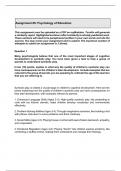Assignment 06: Psychology of Education
This assignment must be uploaded as a PDF on myModules. Turnitin will generate
a similarity report. Highlighted sections reflect similarity to already published work.
These sections will need to be paraphrased (written in your own words and cite the
source). You may revise your assignment and re-submit. The maximum number of
attempts to submit an assignment is 3 (three).
Question 1
Many psychologists believe that one of the most important stages of cognitive
development is symbolic play. You have been given a task to help a group of
parents to understand symbolic play.
In ten (10) points, explain in what way the quality of children’s symbolic play can
have consequences on the children’s later development. Include examples that are
relevant to the group of parents you are speaking to. Indicate the age of the learners
that you are referring to.
Symbolic play is indeed a crucial stage in children's cognitive development. Here are ten
points explaining how the quality of children's symbolic play can have consequences on
their later development, with examples relevant to parents:
1. Enhanced Language Skills (Ages 2-3): High-quality symbolic play, like pretending to
cook with toy kitchen utensils, helps children develop vocabulary and communicate
effectively.
2. Problem-Solving Abilities (Ages 3-4): Through imaginative scenarios, like building a fort
with pillows, kids learn to solve problems and think creatively.
3. Social Skills (Ages 3-5): Playing house or school with peers fosters teamwork, empathy,
and cooperation.
4. Emotional Regulation (Ages 4-6): Playing "doctor" lets children explore emotions, like
comforting a stuffed animal, helping them understand and manage their feelings.
, 5. Math and Literacy Readiness (Ages 4-6): Sorting toy animals by type or playing "store"
with pretend money lays the foundation for early math and reading skills.
6. Imagination (Ages 2-6): Encouraging diverse symbolic play, such as being pirates on a
treasure hunt, fuels creativity.
7. Cultural Understanding (Ages 4-8): Playing with dolls from different cultures helps kids
learn about diversity and inclusion.
8. Executive Function (Ages 4-7): Planning and executing complex imaginative scenarios,
like a superhero adventure, improve cognitive control.
9. Self-Identity (Ages 2-6): Symbolic play allows children to experiment with roles, aiding
in the development of their self-identity. For example, pretending to be a superhero or a
parent.
10. Academic Success (Ages 6-7): High-quality symbolic play in early years can lead to
improved academic performance, as it builds a strong foundation for learning and
problem-solving.
In summary, parents should encourage and participate in their children's symbolic play,
as it not only fuels creativity and imagination but also lays the groundwork for various
cognitive and social skills crucial for later development.





